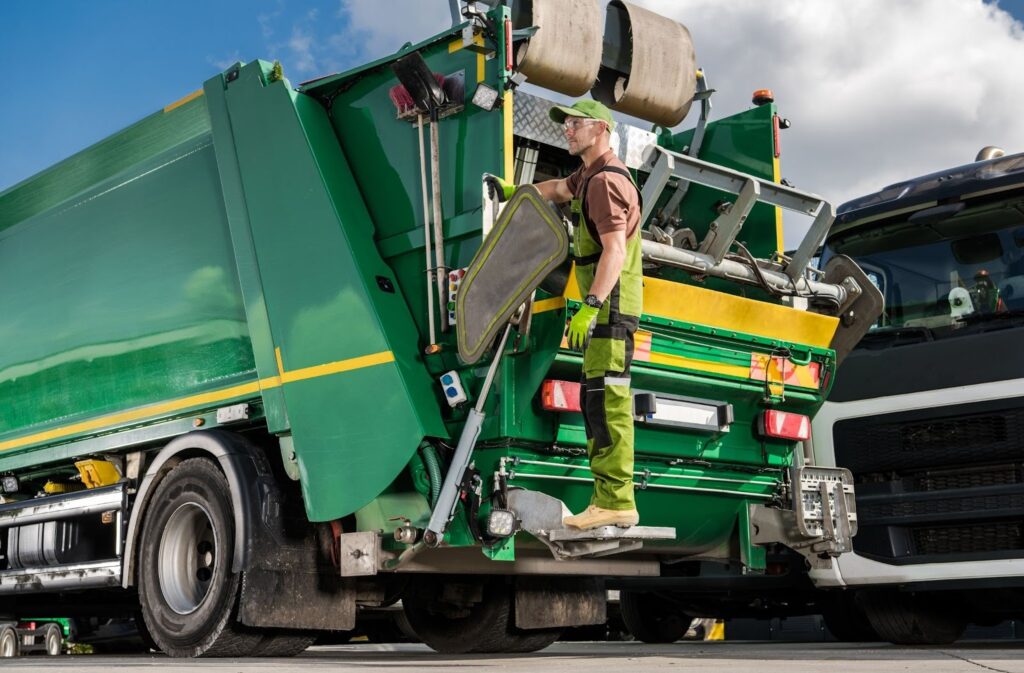When bulky waste management services are needed on a fixed cadence, loading docks stop being choke points and become smooth, time-boxed workflows. Crews know exactly when to stage pallets, fixtures, and returns, and service partners know exactly when to arrive with the right equipment. That rhythm reduces overtime, cuts “urgent haul” fees, and keeps aisles and fire lanes clear for normal operations. Predictability is a quiet competitive advantage—less chaos, fewer distractions, and more time focused on customers and core work.
Cutting Total Costs Begins With Scheduled Waste Management Bulk Pickup
One-off hauls feel flexible, but they’re priced like emergencies. A recurring route usually lowers the cost per lift, improves truck utilization, and lets providers plan staffing and fuel more efficiently—savings they can pass along. Regular cadence also prevents compactor overfills, overweight fees, and last-minute container rentals. As loads become more consistent, you can right-size containers and frequency, trimming budget without risking overflow or odor complaints.
Safety And Compliance Improve When Waste Management Bulk Pickup Is Routine
Forklifts dodging ad hoc piles, blocked egress paths, and improvised storage increase incident risk. A set pickup calendar encourages disciplined staging zones, proper stacking, and safer line-of-travel for people and equipment. It also makes compliance easier: regulated items get isolated, manifests are complete, and photos of clean bays support audits. Fewer tripping hazards and clearer procedures reduce Workers’ Comp exposure and keep inspections uneventful.
Facilities Run Better With Waste Management Bulk Pickup In The Plan
Bulky waste isn’t just trash—it’s the tail end of purchasing, merchandising, and maintenance. Coordinating fixture resets, seasonal changeovers, and vendor returns to land just before a bulk pickup collapses handling steps. You touch items fewer times and move them fewer feet, which saves labor and shrink-wrap. The result is faster resets, less double-handling, and cleaner receiving bays ready for the next truck.
Stage And Segregate For Speed
Create clearly labeled zones for metal, wood, mixed bulky, and regulated items. Segregation accelerates loading and reduces the risk of rejections at the transfer station.
Document The Stream
Snap quick photos of staged piles and final loads. Visuals help resolve disputes and refine estimates for future cycles.
Waste Management Bulk Pickup Supports Brand Experience
Overflow behind a store or in a shared alley is a reputational liability. Regular bulk service keeps sightlines clean, reduces odors, and limits scavenging or illegal dumping that can follow messy areas. Clean back-of-house translates into cleaner front-of-house: fewer pests, fewer blocked parking spots, and better curb appeal. When the environment around your building looks cared for, shoppers and tenants feel safer, stay longer, and return more often.
Sustainability Results Get Easier With Waste Management Bulk Pickup
Consistent, pre-sorted bulky material is simpler to recycle or divert. Pallets can be returned or baled, metals can be clean-loaded, and cardboard can be routed to rebates instead of the trash stream. Over time, diversion rates climb because the process is built into the cadence. Reporting improves too—weights, materials, and photos arrive on schedule, feeding ESG dashboards without end-of-quarter scrambles.
Clean Loads Drive Results
When wood, metal, and OCC aren’t cross-contaminated, more tonnage qualifies for recycling. Better diversion usually means lower disposal fees.
Measure What Matters
Track weights per pickup and diversion percentage by location. The sites with the best metrics become training examples for the rest.
Multi-Site Consistency Grows With Standardized Waste Management Bulk Pickup
Portfolio managers gain leverage and clarity by standardizing container labels, staging maps, and service windows across locations. A common playbook shortens onboarding, reduces errors during staff turnover, and produces apples-to-apples reports. Aggregated volume across the portfolio can unlock better pricing tiers and priority routing during peak seasons. Consistency also makes it simpler to pilot improvements in one market and roll them out everywhere.
Waste Management Bulk Pickup Keeps Projects On Time
Construction and refresh cycles generate surges of bulky debris—fixtures, drywall stacks, and packaging—that can stall trades if not cleared quickly. Scheduling extra bulk pickups to bracket demo and fixture install days keeps job sites safe and productive. With predictable removals, GCs can reclaim floor space faster, reduce container rental days, and keep inspections on schedule. Time saved in debris handling often returns as calendar days saved on the project’s critical path.
Coordinate Windows With Trades
Plan pickups to land after milestone tasks—demo, fixture set, and final punch. Debris clearance timed to work phases prevents costly idle time.
Mind The Heavy Items
Dense debris can overweigh containers quickly. Communicate materials upfront so the right truck and tonnage allowance arrive.
Technology Makes Waste Management Bulk Pickup Smarter
Simple tools—photo check-ins, ETA portals, and sensor-equipped compactors—create accountability and reduce guesswork. Drivers upload before/after images; dispatch shares live ETAs; managers get alerts if a bay is blocked or a load looks contaminated. Over a quarter, those data points reveal patterns: which days run heavy, which locations need a larger container, and where training will prevent rejections. Tech doesn’t replace discipline, but it amplifies it.

Business Continuity Depends On Resilient Waste Management Bulk Pickup
Holidays, storms, and labor shortages can interrupt routes. Companies that pre-negotiate makeup windows, emergency hauls, and temporary container drops recover faster and keep docks operational. Transparent chains of communication—who to call and what photos to send—speed resolution when a lift is missed. A small overflow buffer zone and a list of pre-approved alternates turn potential downtime into a minor schedule shift instead of a service crisis.
Build A Surge Plan
Template a one-page checklist for overflow staging, signage, and temporary barricades. When volume spikes, teams know exactly what to do.
Confirm Holiday Variances
Publish seasonal route changes to all locations. “Next business day” differs by market; clarity prevents accidental overflows.
Contracts And SLAs Should Lock In Waste Management Bulk Pickup Reliability
Put expectations on paper: pickup windows, blocked-access protocols, response times, photo documentation, and acceptable materials. Include storm procedures, holiday calendars, and escalation contacts. Tie credits to time-bound remedies—missed lift today, corrected within 24 hours. Well-crafted SLAs align incentives, prevent invoice surprises, and make exceptions easy to resolve with evidence rather than debate.
Train Staff To Get The Most From Every Waste Management Bulk Pickup
Great programs fail without clear behavior at the bin. Replace dense posters with image-based signs that match real containers and list “never load” items. Walk each shift through staging locations and load-height limits, and explain why segregation matters to diversion and costs. A 10-minute monthly refresher and quick shout-outs for clean audits keep habits strong and results steady.
Train The Throw
Put the correct container inches from the waste source. People sort better when the bin is where the waste happens.
Keep The Bay Clear
Mark a no-parking window around pickup time. Clear approaches mean on-time lifts and fewer return-trip charges.
Calculating ROI For Waste Management Bulk Pickup Makes The Case Stick
Start with avoided costs: emergency hauls, overweight fees, overtime for reactive cleanups, and productivity lost to blocked docks. Add revenue from rebates on clean metals, pallet returns, or baled OCC. Then measure soft benefits that become hard over time—fewer pest calls, fewer slip-and-fall incidents, and better inspection outcomes. Most businesses find that a small monthly premium for predictability returns multiples in saved time, lower risk, and stronger brand presentation.

Piloting Waste Management Bulk Pickup With Confidence
Pick one high-traffic site and set a weekly or biweekly cadence for four weeks. Log weights, photos, and any access issues at each lift. Adjust staging maps after week one, fine-tune the window after week two, and confirm container size after week three. In week four, lock the configuration and document the SOP with photos. Roll the proven setup to the following two sites and repeat. Iteration beats guessing, and quick wins build momentum across the portfolio.
Set The Baseline
Weigh-per-lift, fullness at pickup, and contamination notes are your core metrics. They tell you where to upsize, downsize, or retrain.
Iterate Then Lock
Tweak frequency and staging early, then standardize. Consistency across sites makes reporting and training far simpler.
Waste Management Bulk Pickup Pays Off Across Operations
With a predictable cadence, safer staging, and clear SLAs, bulky material stops being a daily headache and becomes a managed process. Costs stabilize, docks stay clear, diversion improves, and customers never see a mess. Whether you run a single warehouse or a national portfolio, the combination of planning, training, and simple tech turns bulky waste from liability to leverage. Build the routine now, and you’ll bank time and money every week going forward.
Visit our Top Dog Waste Solutions blog to learn more about how businesses benefit from regular waste management bulk pickup.








